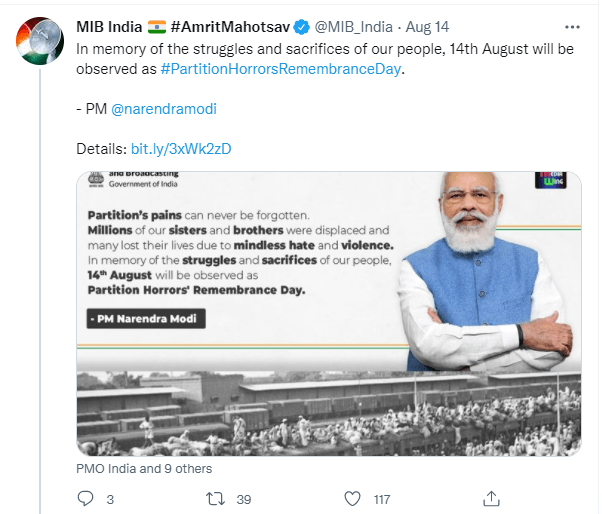
The Union Home Ministry has announced that 14th August would henceforth be observed as ‘Partition horrors remembrance day.’ A gazette notification issued on the occasion stated, ‘The Government of India declares 14th August as Partition Horrors Remembrance Day to remind the present and future generations of Indians of the pain and suffering faced by the people of India during the partition.’ Over 20 Lakhs died, millions suffered as they moved from Pakistan to India and vice versa. This was a period of ruthless killings on religious grounds. It was the commencement of enmity between India and Pakistan, which continues to this day. The announcement appeared to hold Pakistan responsible for the mayhem during the partition.

The Prime Minister stated, ‘Partition pains can never be forgotten. Millions of our sisters and brothers were displaced and many lost their lives to mindless hate and violence. In memory of the struggles and sacrifices of our people, 14th August will be observed as Partition Horrors Remembrance Day.’ He added, ‘May the PartitionHorrorsRemembranceDay keep reminding us of the need to remove the poison of social divisions, disharmony and further strengthen the spirit of oneness, social harmony and human empowerment.’ While his tweet covered sufferings on both sides, there is no doubt against whom it was aimed.
The choice of dates had possibly three intentions. Firstly, it was a day before independence, ideal to remember those who lost their lives moving from one country to the other. The second, it was Pakistan’s Independence Day and would mar their celebrations. By marking this day as partition horrors remembrance day, the lustre of Pakistan’s celebrations is impacted. The third was blaming Pakistan and its Muslim league for inhuman acts during partition.
With the passage of time, media houses would invite members of families of those who suffered the horrors of partition to discuss their experiences. These would be from both sides of the border. There would be writings on media platforms highlighting the horrors of partition. In India, on 14th August there would be remembrance ceremonies to pay respect to those who lost their lives during the partition. A celebratory occasion for Pak would be marred by the discussion on the pains of partition and the manner it impacted the subcontinent.
In the current scenario in Afghanistan, where the Pakistan-backed Taliban has grabbed power, displacement of the population is becoming a global concern. Without naming Pakistan, the announcement is sending a global message on what a repressive regime takeover can mean for innocent civilians. Pakistan faces global backlash for supporting the Taliban and hence would at some stage be questioned for its role.
The Pak foreign office jumped in immediately to comment on the government of India’s decision. Its spokesperson stated, ‘It is shameful that the practitioners of ‘Hindutva’ ideology, and purveyors of hate and violence, would so hypocritically and one-sidedly invoke the tragic events and mass migration that occurred in the wake of Independence in 1947. Distorting history and stoking communalism is the special forte of the RSS-BJP regime. Far from doing anything to heal old wounds, they would go to any extent to sow further dissensions for electoral gains.’ He added, ‘We are sure that the people of goodwill in India would completely reject this political and publicity stunt that only seeks to divide.’ Pakistan’s comments indicate that it visualizes the day is to create an anti-Pak sentiment in India. The comments of their spokesperson would soon be supported by their political leadership.
Within India, the announcement too had its critics. It was the Congress government in power during the time of independence. Its spokesperson and those of few other political parties termed the decision as divisive politics claiming that since the division of the two nation’s was on religious lines, this announcement would enhance the religious divide within the country. Largely, the government view was supported. Within Pak also, there would be many who suffered similarly and would feel that honouring them is the right step.
Also Read:
PM’s speech on the 74th Independence Day
Within Kashmir, there are many who similarly suffered, including when Pak released its militia and army to create mayhem in the state when it attempted to forcibly annex it. These memories would revive anger towards Pak. For Imran Khan and his government, it would be another law they would demand that the Indian government rescind prior to any talks, similar to their demands of repealing the abrogation of article 370. This is the law that has lowered the celebration of their independence day and they would prefer it is withdrawn.

